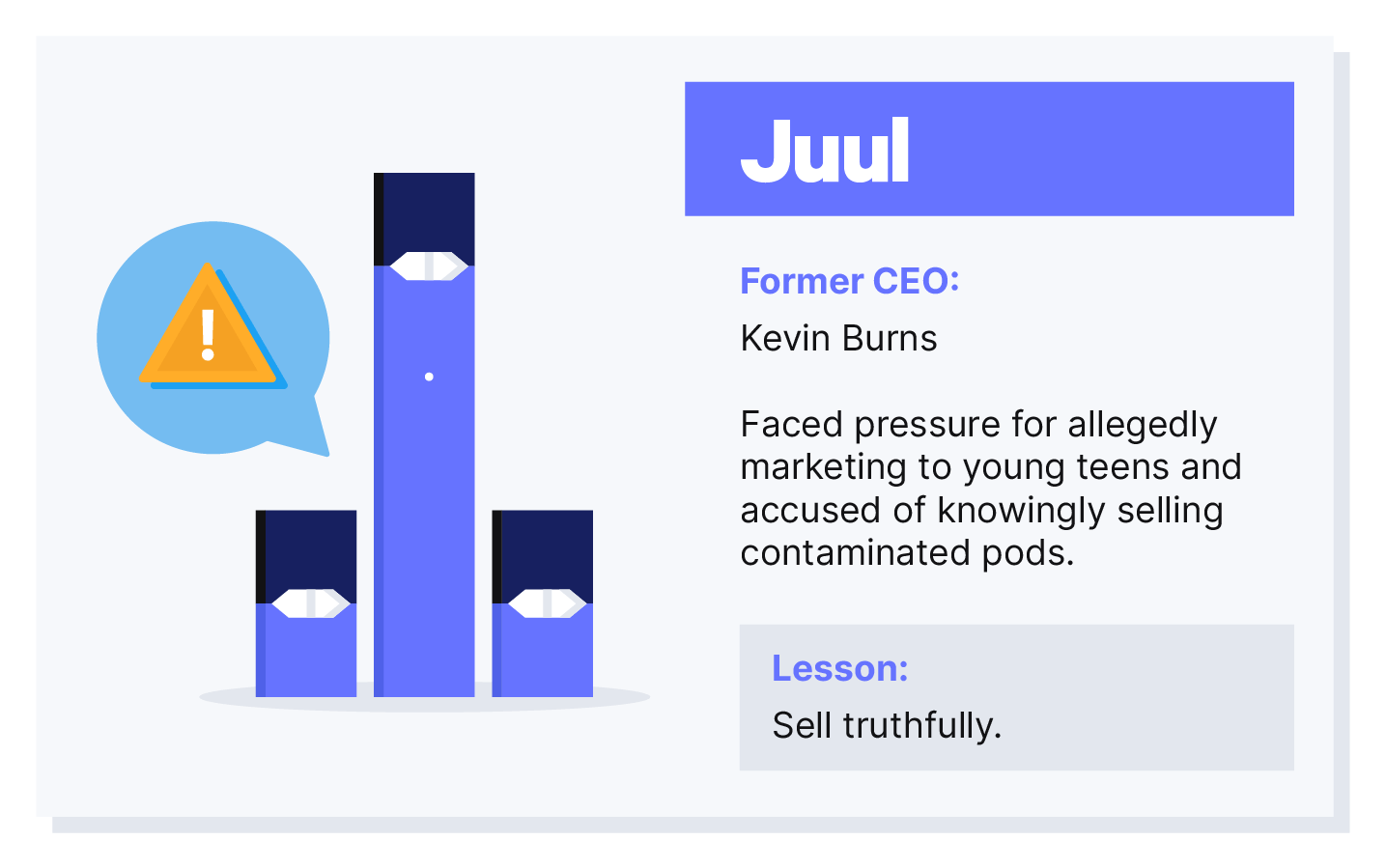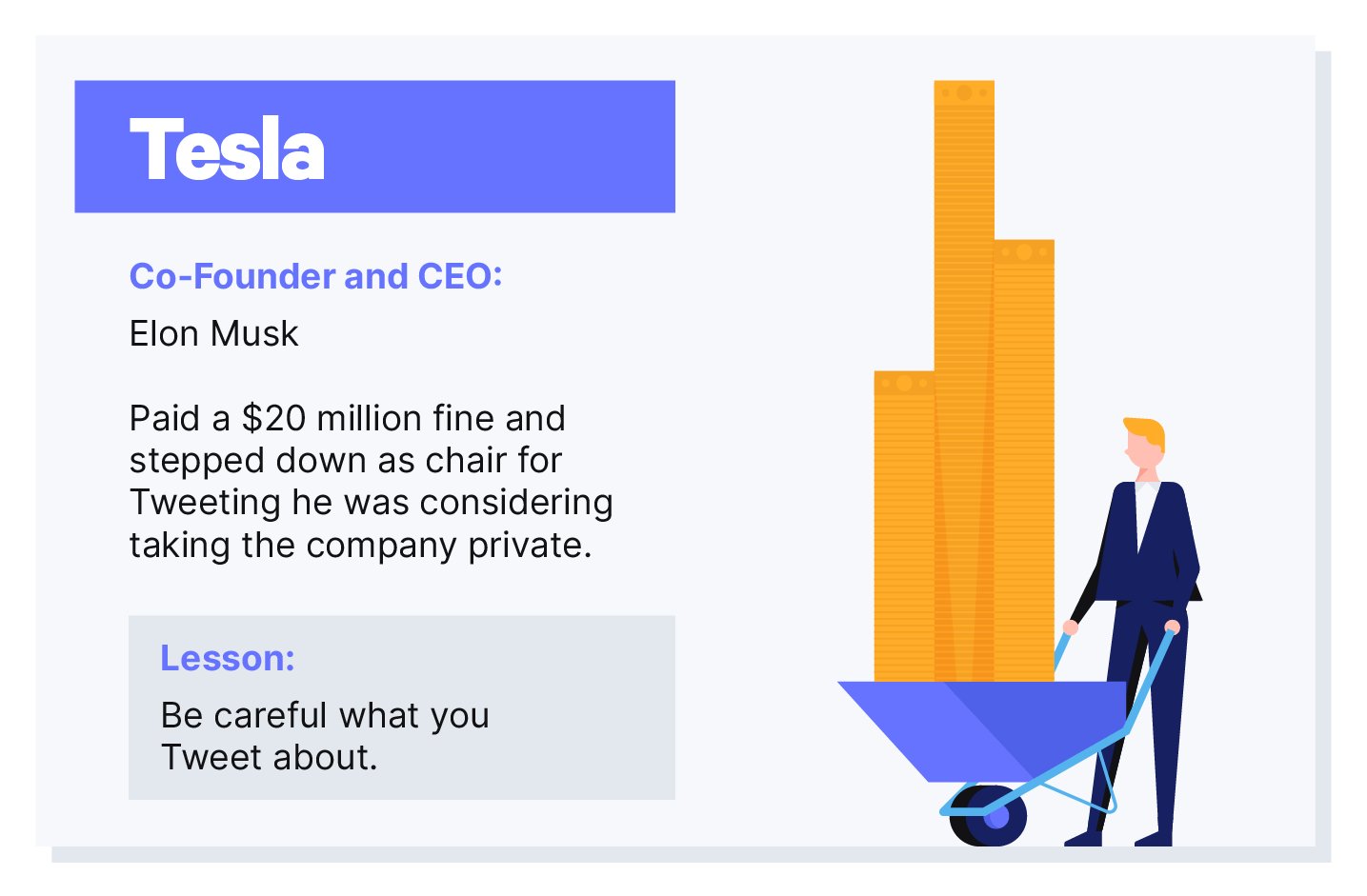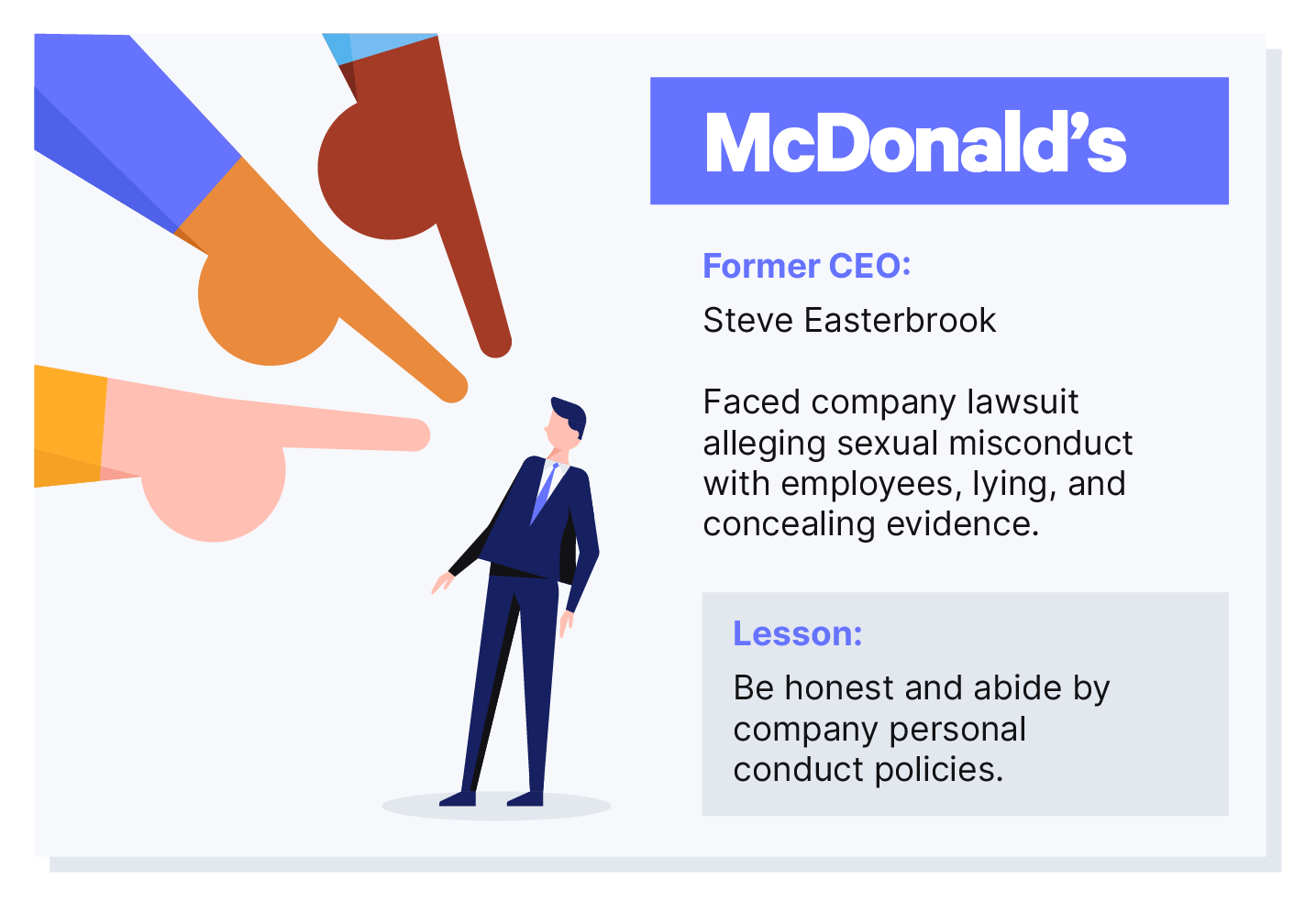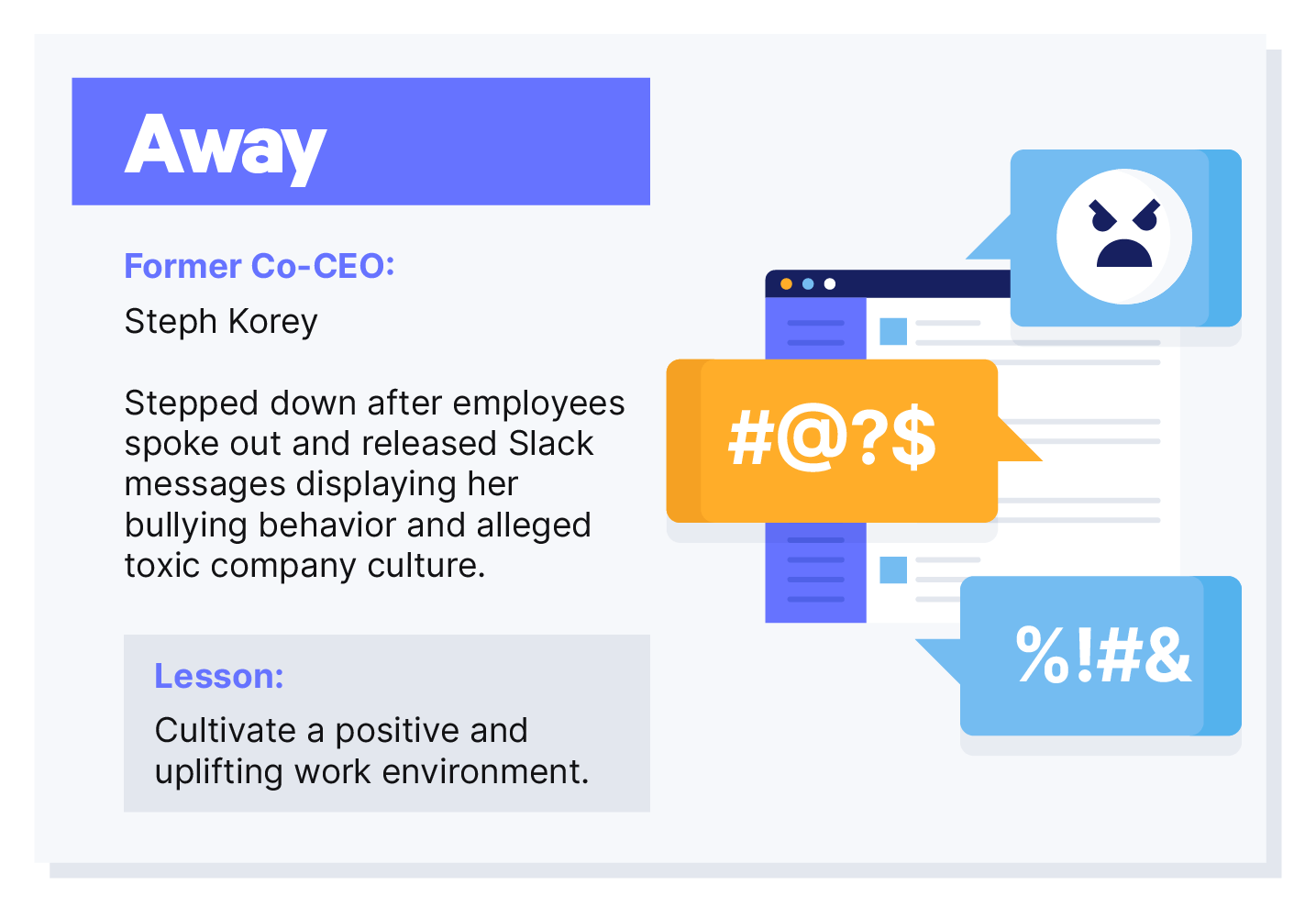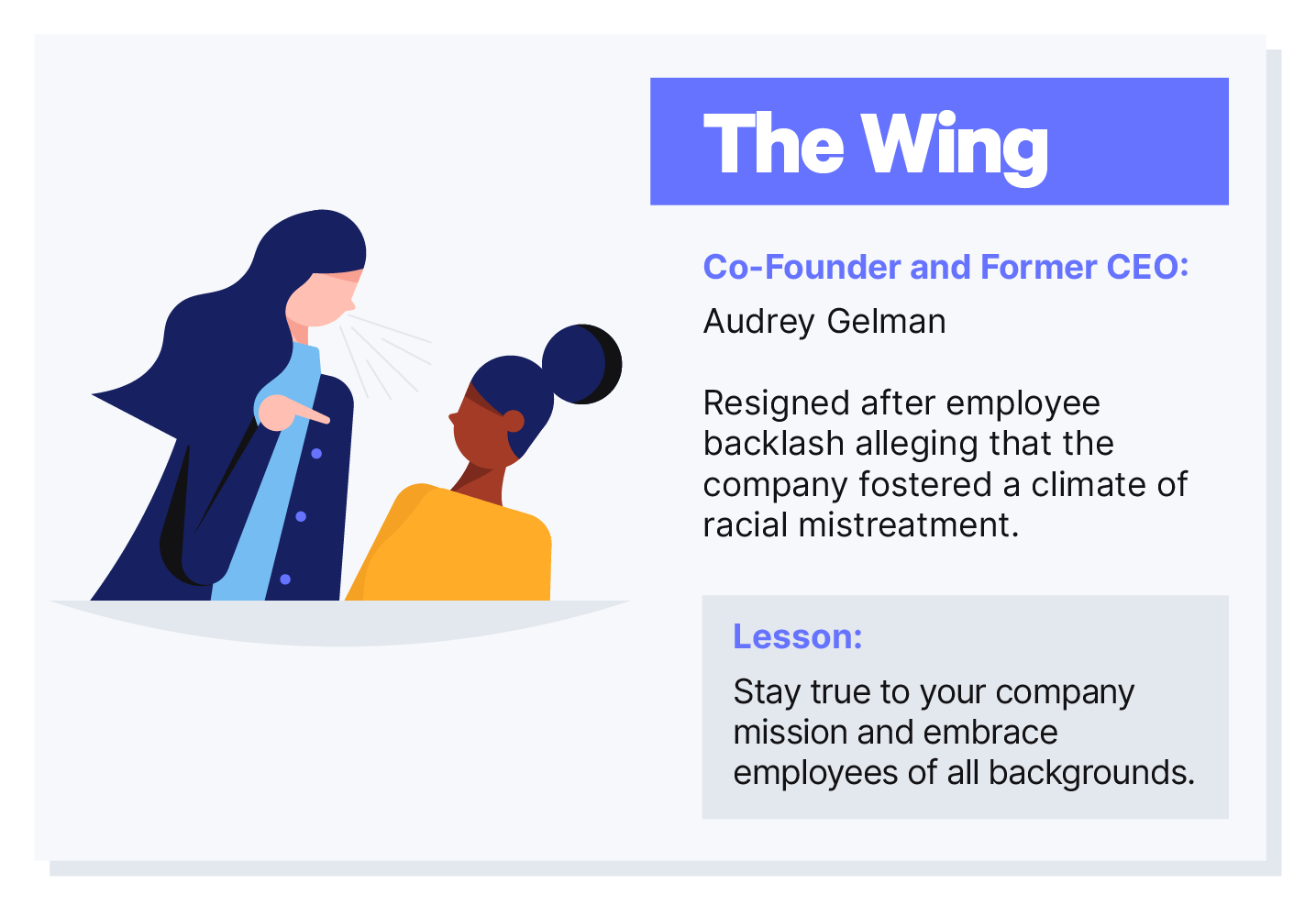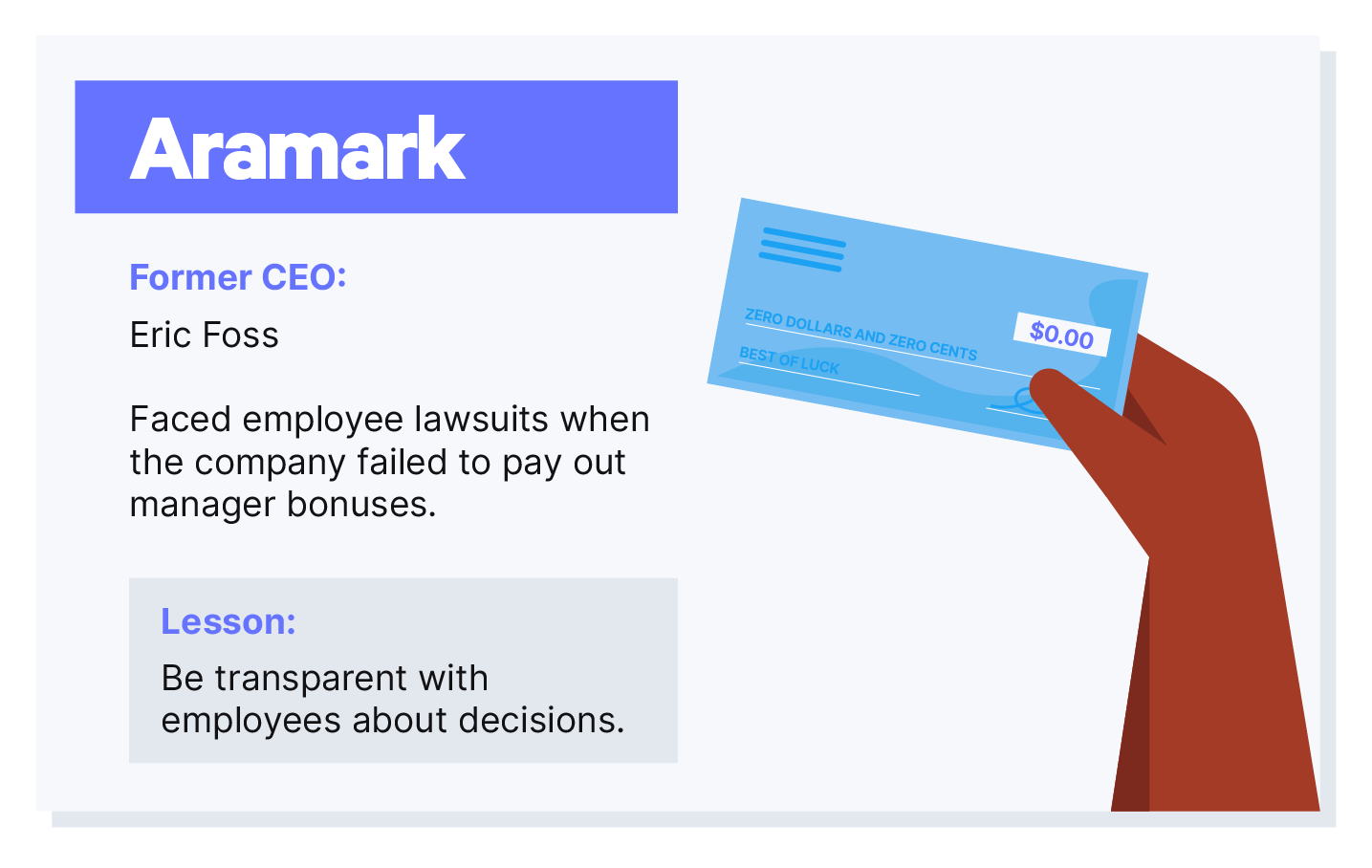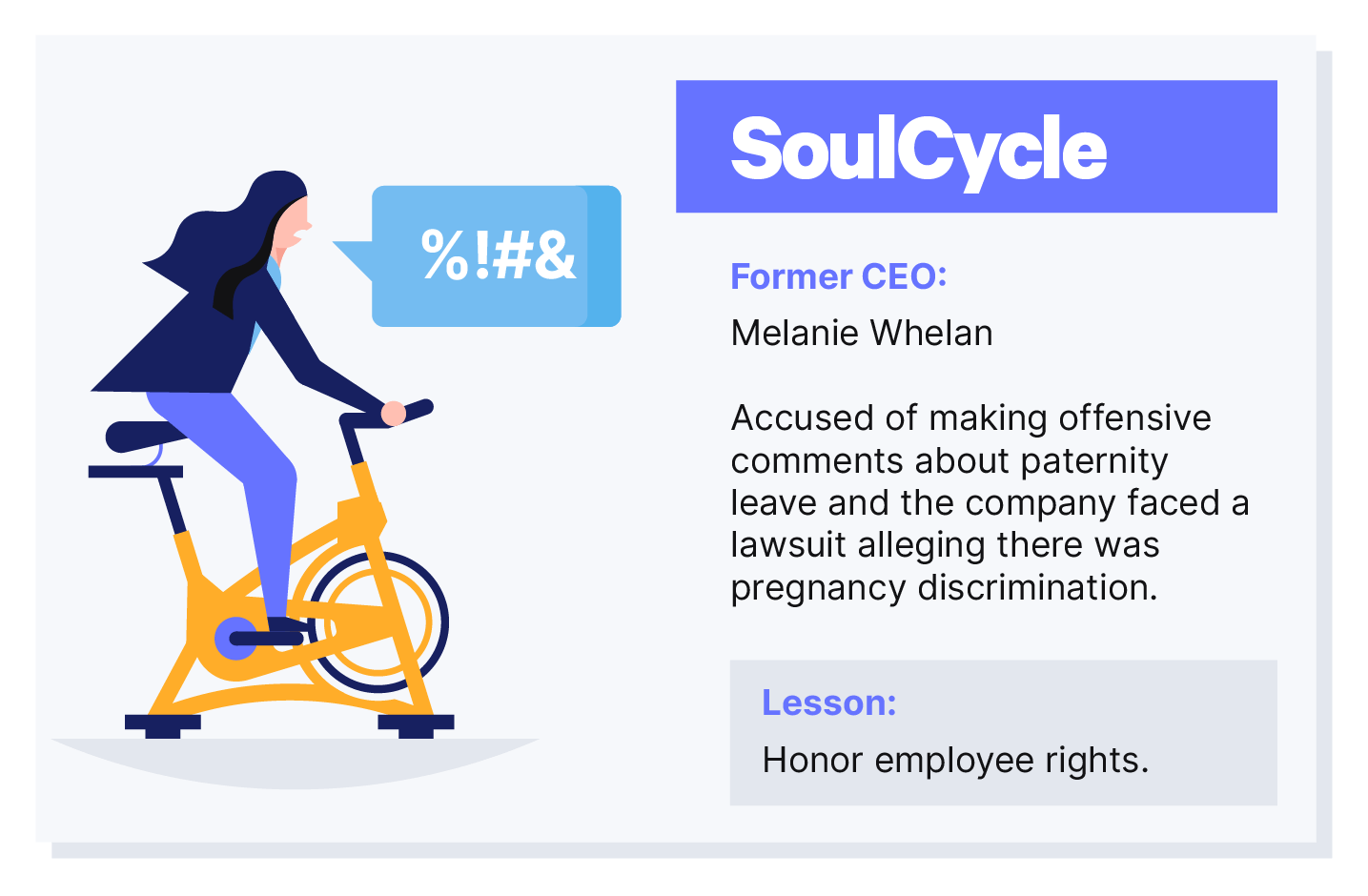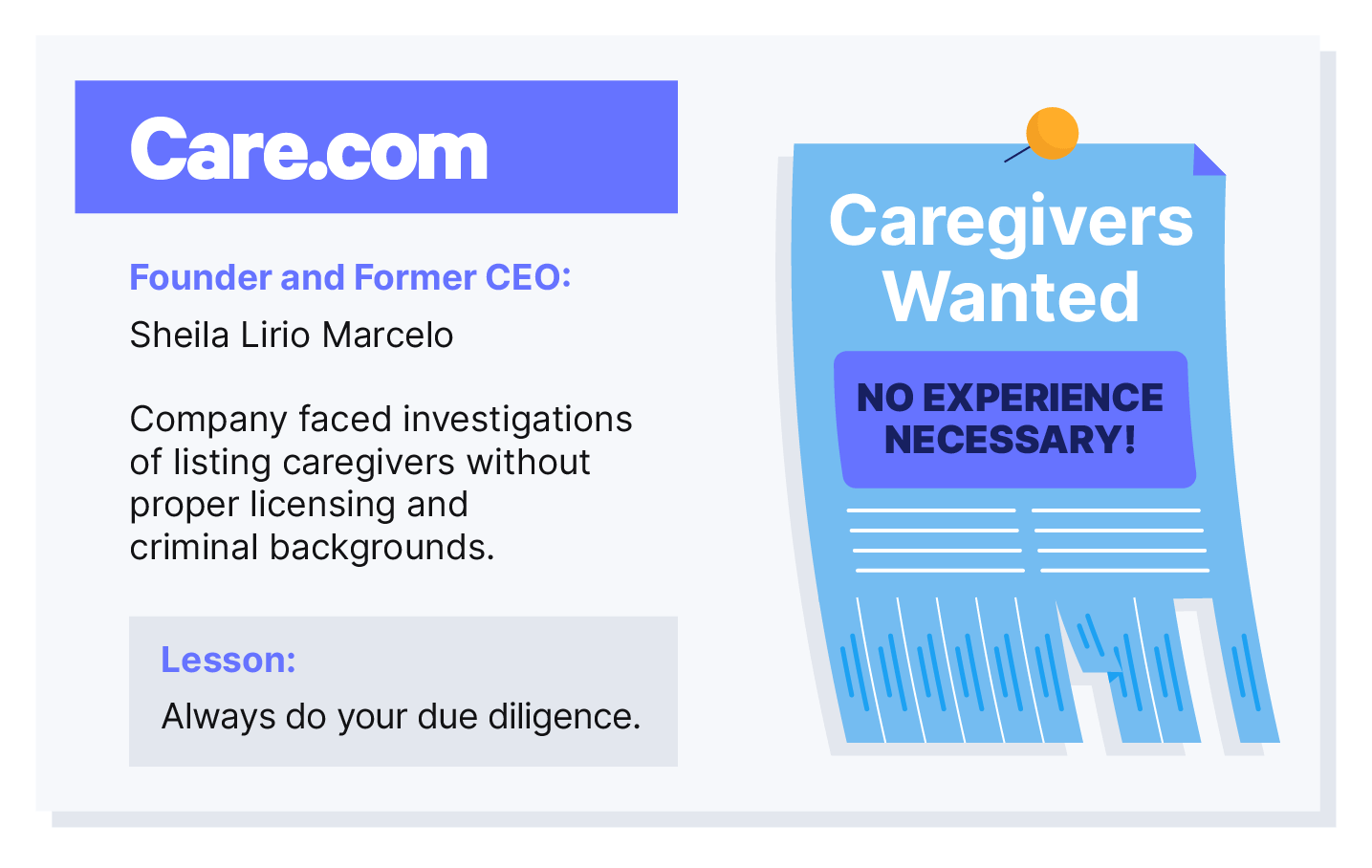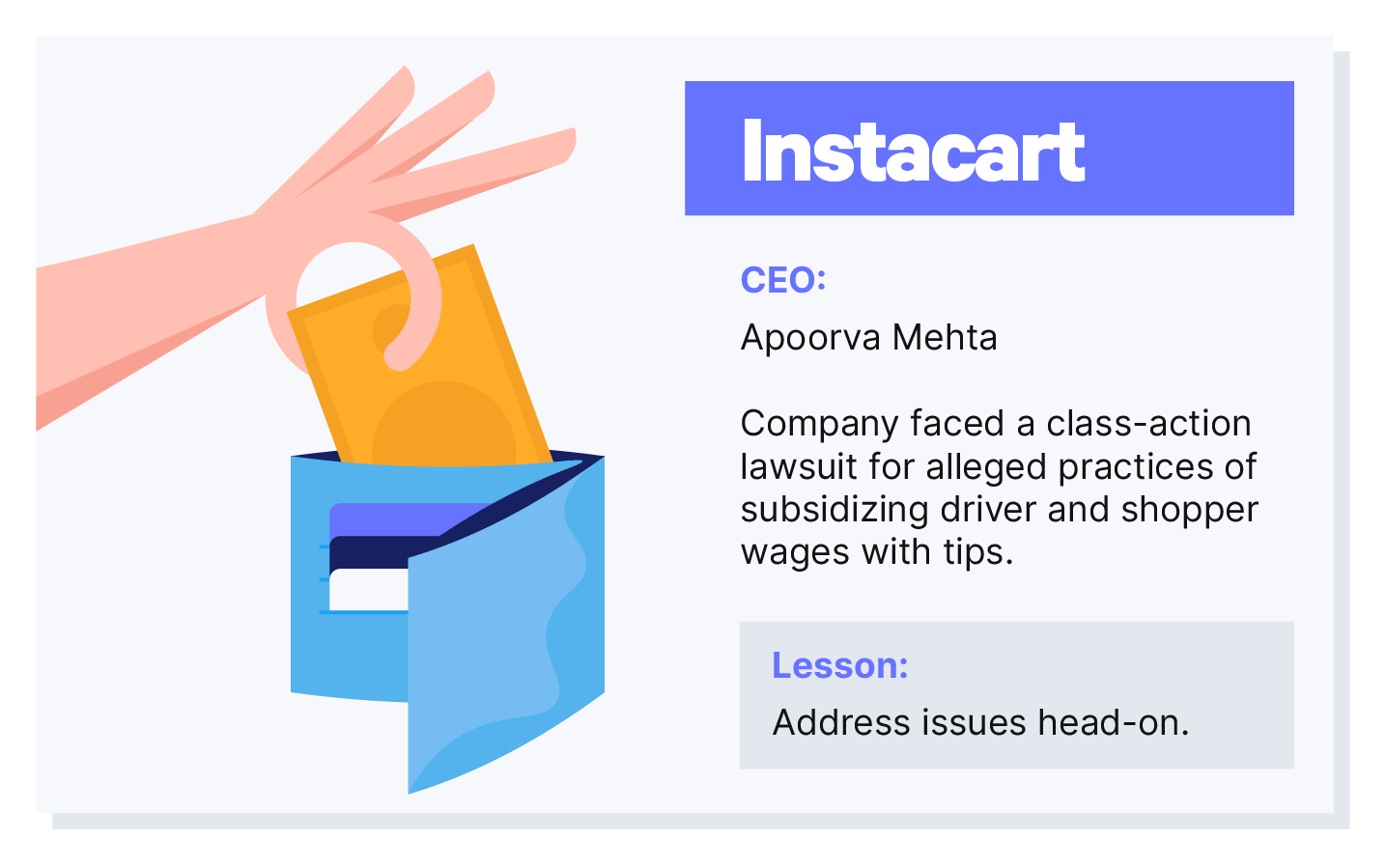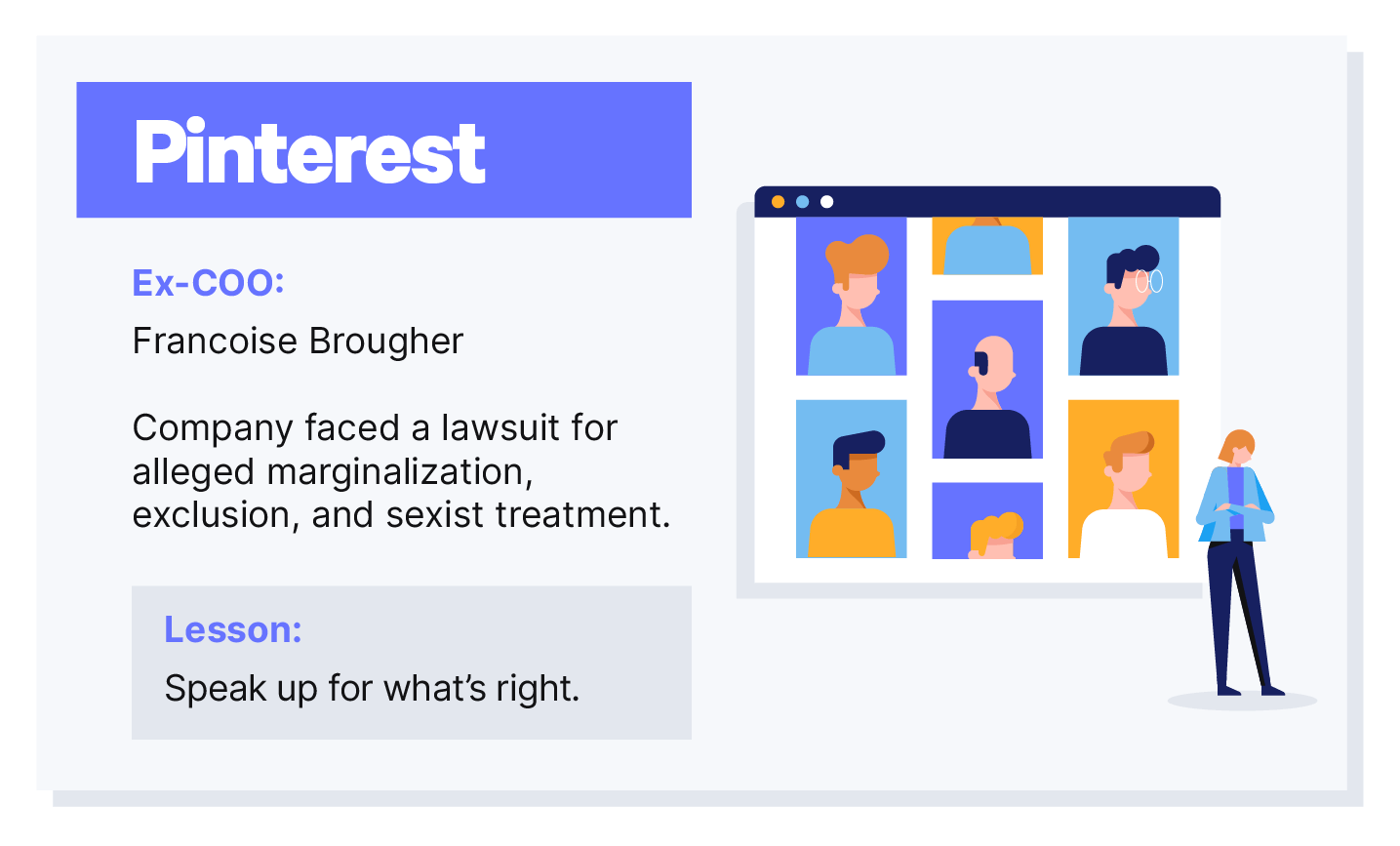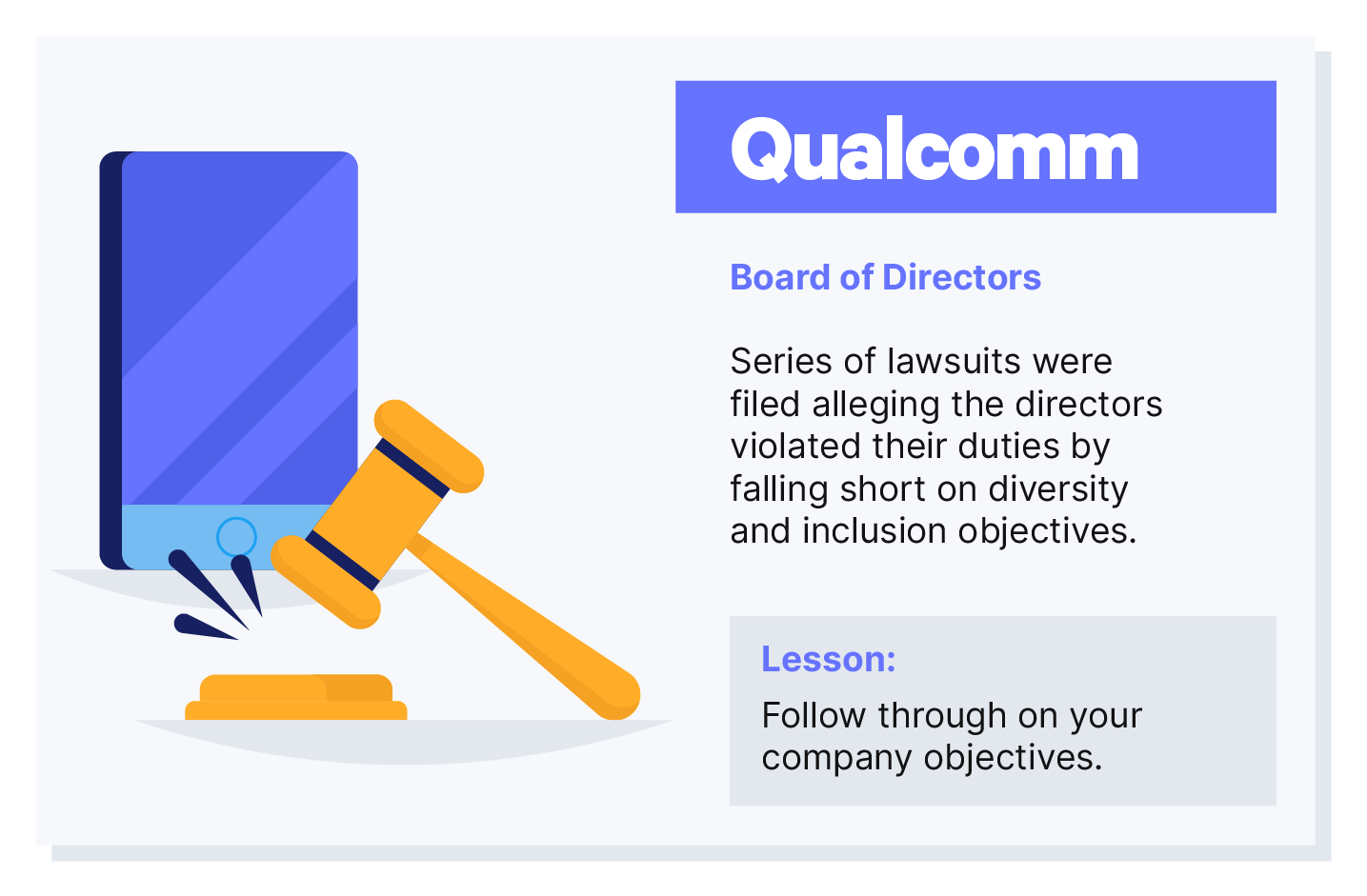12 lessons from major CEO and company lawsuits
Learn valuable lessons from major company lawsuits like Juul or Tesla that can be helpful to any leader of a company regardless of its stage.
Table of Contents
- 1. Sell truthfully.
- 2. Be careful what you tweet about.
- 3. Abide by company policies.
- 4. Cultivate a positive, uplifting work environment.
- 5. Stay true to your company’s core values.
- 6. Be transparent about decisions.
- 7. Honor employee rights.
- 7. Honor employee rights.
- 8. Always do your due diligence.
- 9. Address issues head-on.
- 10. Speak up for what’s right.
- 11. Follow through on improving company objectives.
- 12. Prioritize compliance and transparency.
Protect your business today!
Get a QuoteProtect your business today!
Get a QuoteGone are the days of turning a blind eye to company lawsuits. More than ever, company executives, officers, and leaders are being held accountable for their actions and forced to endure company lawsuits.
Plus, a CEO in hot water means the company faces repercussions and potential company lawsuits too. A leader’s reputation is often linked to the company’s values — or even the bottom line.
Whether it’s entanglements of scandal and sexual harassment or employees speaking out against unfair treatment, actions (and words) speak volumes. Besides, consumers can see right through the so-called public image. Movements, such as #MeToo and Time’s Up, are helping to shift and combat power imbalances of company higher-ups.
In 2024, 2,221 executives resigned, a record number. A large number of the executives who stepped down did so due to company lawsuits, with tech being one of the highest sectors. This represents a 16% increase from 2023. Although a typical CEO remains in the role for 7.2 years on average, legal issues pose major threats to these positions and, ultimately, company or shareholder value.
In this post, we will dive into major CEO or company lawsuits from which any leader can learn a lesson.
1. Sell truthfully.
Juul, the popular e-cigarette company, has faced major heat since its inception. Not only was there a vaping crisis where Congress and the Federal Drug Administration stepped in, but Juul was under pressure for allegedly marketing to young teens.
Former Juul executive, Siddharth Breja, claims he was fired in retaliation for raising concerns that Juul allegedly sold contaminated mint-flavored pods and refused to recall them. Amidst the “culture of intimidation” claims and rising scrutiny around the vaping industry, CEO Kevin Burns eventually stepped down from his role.
2. Be careful what you tweet about.
Elon Musk, the Co-Founder and CEO of Tesla, is known to take to X (formerly Twitter) to share eccentric updates, responses, or funny memes. Musk, however, faced a lawsuit from the Securities Exchange Commission after he tweeted that he was considering taking the company private.
The tweet surprised investors, analysts, and Tesla’s board of directors and because of it, Musk was sued for sharing false or misleading statements. Musk backtracked on the statement and settled with the Securities Exchange Commission by agreeing to pay a $20 million fine. Soon after, he stepped down as chairman of the company’s board.
3. Abide by company policies.
Steve Easterbrook, the ex-CEO of McDonald’s, was sued by the company for violating its personal conduct policies. After investigations, the fast-food giant reported that Easterbrook allegedly had relationships with three employees (one of which he granted stock options to).
The lawsuit also indicates that Easterbrook lied about the relationships and attempted to erase any evidence that they occurred. Today, leaders face repercussions for not just acting inappropriately, but also for failing to be transparent and honest.
4. Cultivate a positive, uplifting work environment.
Away is a direct-to-consumer luggage brand known for its suitcases and bags “built for modern travel.” However, the female-founded company that hoped to cultivate a vision of inclusive travel was actually in internal turmoil.
Steph Korey, the former co-CEO, stepped down after former employees spoke up and released Slack messages that The Verge then published in an article. The messages gave a glimpse into the toxic company culture and management style. Shortly after resigning and issuing an apology, Korey claimed that she had made a mistake in leaving and returned to her role.
Korey took to Instagram to publish stories criticizing how the media portrays female founders (saying women are targeted since stories about them get more “clicks”), which upset Away employees and “reflected poorly on the company.” Following this backlash, a spokesperson reported that Korey will forfeit all CEO responsibilities by the end of 2020, and Stuart Haselden will take over as the sole CEO.
5. Stay true to your company’s core values.
The Wing is a female-focused co-working space with offices in major cities such as NYC, San Francisco, L.A., Chicago, and more. Co-Founder, Audrey Gelman, started The Wing with the goal of it being a “utopia” for women. However, despite this goal and with its women-only policy came backlash.
In 2018, The Wing faced a $12 million lawsuit alleging its “illegal discrimination against men.” This wasn’t the last of the issues for the co-working collaborative. Amidst employee reports that the company fails to “practice the intersectional feminism that it preaches,” specifically to women of color, Gelman resigned from her position.
Following the announcement, employees felt the resignation wasn’t enough. They issued a statement and petition outlining their demands and staged a digital walkout in solidarity with their colleagues.
6. Be transparent about decisions.
Aramark Corporation, the food, facility, and uniform services provider, faced employee lawsuits when the company failed to pay out performance-based bonuses for many of its managers. The managers raised concerns that they weren’t aware of the change, some of which lost up to 20% of their expected annual compensation.
There was alleged controversy around Eric Foss, the former CEO, and his abrupt departure from the company shortly after the lawsuit was filed. Aramark eventually agreed to settle the lawsuit for $21 million, and the settlement is expected to benefit over 4,000 current and former employees.
7. Honor employee rights.
7. Honor employee rights.
The former SoulCycle CEO, Melanie Whelan, faced legal complaints accusing her of making offensive comments to a senior VP about paternity leave.
A former executive issued a complaint with the Equal Employment Opportunity Commission accusing SoulCycle of pregnancy discrimination. She claimed she was demoted after disclosing that she was pregnant and then fired 32 days after giving birth.
A spokesperson from the spin-focused studio chain responded that the company “strongly disagrees with the accusations.” Whelan eventually stepped down as CEO due to a reported decline in memberships.
8. Always do your due diligence.
Care.com is an online resource that helps families find and manage caregiving services. An investigative piece by The Wall Street Journal found instances where caregivers listed on Care.com had police records and were accused of committing crimes while caring for people.
While there was no official lawsuit, Care.com responded by removing tens of thousands of unverified providers, implementing new security policies, and releasing a clarifying statement that it did not verify the information for each center. Although Sheila Lirio Marcelo did not state these reports were the reason, the former CEO soon after stepped down and shifted to a new position as an executive chairwoman.
9. Address issues head-on.
Instacart, the grocery delivery app, faced a class-action lawsuit over employee wages and tips. Drivers and shoppers spoke out against Instacart’s practices, alleging that the company “intentionally and maliciously misappropriated gratuities in order to pay plaintiff’s wages even though Instacart maintained that 100 percent of customer tips went directly to shoppers.” Instacart has faced an employment case in the past too, settling for $4.6 million in 2017.
Instacart CEO, Apoorva Mehta, immediately released a blog post of the company’s actions in response to employee frustrations. The post guarantees higher base compensation for shoppers and that they will no longer include tips in the base pay.
10. Speak up for what’s right.
Silicon Valley has long been known for the tech gender gap and the gender bias that comes with it. Pinterest is now a part of the list, facing a lawsuit from the former COO Francoise Brougher, accusing the social giant of gender discrimination and retaliation. Brougher alleges that she refused to “take a back seat to her male peers,” and because of it was left out of important company decisions. Brougher, who worked as COO for two years, reports she was wrongfully terminated in April 2020 for objecting and speaking out against the treatment.
“Pinterest’s female executives, even at the highest levels, are marginalized, excluded, and silenced,” Brougher said in a statement published on Medium. “According to Pinterest, I was fired not for the results I achieved, but for not being ‘collaborative.’ I believe that I was fired for speaking out about the rampant discrimination, hostile work environment, and misogyny that permeates Pinterest.”
11. Follow through on improving company objectives.
Among other major company lawsuits (such as Facebook) that were filed against directors or boards for diversity or race-related issues, Qualcomm also faced a derivative lawsuit. A shareholder filed against the company’s board alleging that the company’s directors violated their duties to the company and shareholders by falling short of stated objectives on diversity and inclusion.
The complaint also alleges they have failed to include a single African American either on the board or among the company’s senior officers, despite the company’s efforts to increase diversity.
12. Prioritize compliance and transparency.
In 2023, Binance, one of the world’s largest cryptocurrency exchanges, and its CEO, Changpeng Zhao, faced significant legal challenges. The US SEC sued Binance and its CEO for failing to adhere to US laws, including anti-money laundering laws. The suit claimed that Zhao willfully broke US law and knowingly operated an unregistered crypto exchange in the USA. The SEC alleges that Binance allowed high-value customers to trade secretly in the USA despite publicly claiming that there would be restrictions.
In 2025, a federal judge put the case on hold due to pressure from the new SEC commissioner.
In today’s business world, company leaders have a duty not just to improve their companies but also to uphold the promises they make. Whether you run a public company or are launching your new startup, it’s essential to secure D&O insurance to help protect the assets of your company leadership in the event of a crisis, scandal, or lawsuit.

